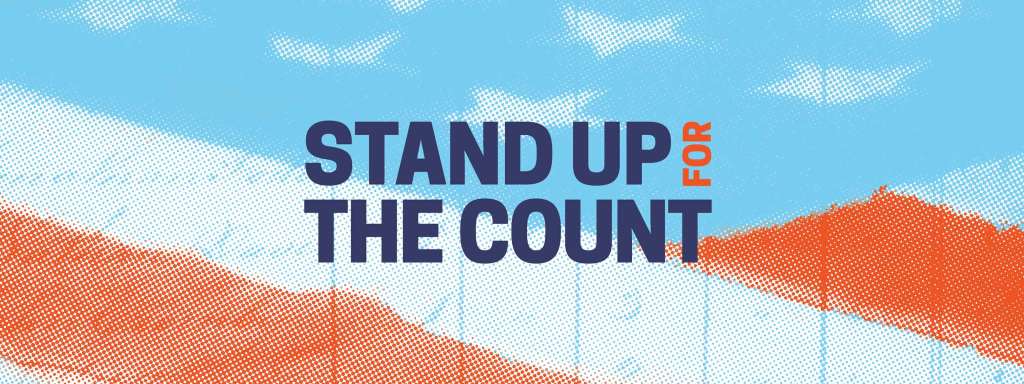
The American Constitution mandates that once every decade we tally how many people live in the United States. This decennial census tells us who we are as a country: where we live and how we live, where we’ve been and where we’re going, who our neighbors are and what our communities look like.
The census also determines how we share a collective voice in government. Census data is used to apportion congressional seats throughout the US—the strength of each state’s representation in our federal government. It determines the electoral college—how much say each state has in electing the president. The census is used to design and draw legislative districts, determining the shared interests and shared voice we have in federal, state, and local government. And it is used as the basis to equitably distribute 800 billion dollars in federal grants—funds that support local schools, libraries, health clinics, transportation, and infrastructure.
To help explain the importance of census data across all parts of our society, the Ford Foundation created this video:
Accessibility Statement
- All videos produced by the Ford Foundation since 2020 include captions and downloadable transcripts. For videos where visuals require additional understanding, we offer audio-described versions.
- We are continuing to make videos produced prior to 2020 accessible.
- Videos from third-party sources (those not produced by the Ford Foundation) may not have captions, accessible transcripts, or audio descriptions.
- To improve accessibility beyond our site, we’ve created a free video accessibility WordPress plug-in.
As we approach 2020, there are serious challenges facing the census. There is a real and growing threat of a significant census undercount, particularly in communities of color, among children and in poor, rural, and immigrant communities across the country. (The CUNY Mapping Service site HTC 2020 identifies and explains specific “hard to count” communities in every state.) Because so many pieces of our democracy and economy rely on census data, an inaccurate census will have devastating consequences. And because the census happens only once every ten years, those consequences will last for a decade.
Which brings us to the biggest challenges facing a fair and accurate census count in 2020:
The Census Bureau is underfunded.
The US Census Bureau, the agency responsible for conducting the census, is severely underfunded, resulting in significant cuts to its local field offices, the number of door-to-door enumerators it will hire, and its advertising and public education efforts. Funding cuts have also caused the Bureau to hold only one limited “end to end” test to identify glitches and gaps, instead of the three or four it has held in previous cycles.
The 2020 census will be the first conducted online.
2020 will be the first time the census will be conducted online, creating the potential for hacking and system crashes, and online disinformation campaigns—all of which are exacerbated by the Bureau’s lack of funding, as well as by distrust of government, particularly in communities of color and immigrant communities.
The current political climate could discourage participation.
The fear and intimidation experienced by immigrant communities and communities of color present real challenges to achieving a fair and accurate count The Census Bureau’s own recent research indicated that the current national climate is likely to discourage census participation. The Commerce Department’s proposal to add a question about citizenship to the decennial census for the first time since 1950 intensifies this challenge.
These are serious problems, but important work to overcome them is well underway. A strong coalition of foundations and advocates are leveraging resources and relationships, working in partnership to assure a fair and accurate count. They have created a multi-prong strategy to prevent the citizenship question from being added to the census, involving new research, litigation, communications, and targeted policy advocacy. While this response is rolled out, the coalition must simultaneously launch a sweeping national public education campaign and build a network of trusted messengers rooted in local communities, to restore trust in the census.
Foundations have begun to respond. More than 300 leaders from diverse foundations across the country came together to sign a letter to the Commerce Department opposing the addition a citizenship question. And several foundation presidents recently co-authored an op-ed in the Chronicle of Philanthropy, calling on foundations to support work to assure a fair and accurate census. “All philanthropists have a stake in the census, no matter what they fund or where,” they explained. “It is incumbent upon us to do whatever we can to guarantee that it proceeds accurately, apolitically, ethically, and efficiently.”
But there are still significant resource gaps: $35 million is needed just to support work at the national level, with additional resources needed for the state and local work that will be critical to connecting at the community level. Now is the time for philanthropy to step up. As Ford Foundation President Darren Walker recently explained to an audience of foundation leaders, the census “is an issue of fundamental justice. And in the United States, justice is not free. . . The stakes are higher than they have ever been for the very missions that our foundations were established to advance. And so it is going to take an extra effort by all of us.”
There is a lot at stake, and not a lot of time. Here are some ways you can work to assure a fair and accurate 2020 census.
- If you are a funder, we need your help! Explore ways to support the important work of organizations at the national, state, and local levels. More information is available through the Funders Census Initiative of the Funders’ Committee for Civic Participation, and United Philanthropy Forum 2020 Census.
- If you are an organization, join with partners working at the national, state, or local level to overcome the challenges described above, engage local communities, and reach hard to count households. There are many organizations coming together to do this work; find out more by visiting censuscounts.org.
- If you are an individual who cares about your community, we hope that you will share this post and help inform others. You can also apply for a census job to help assure a fair and accurate count in your community.
